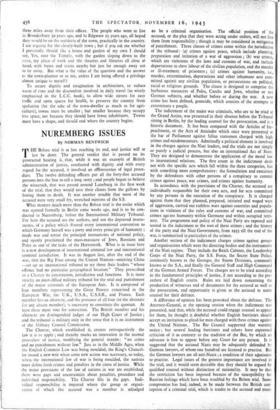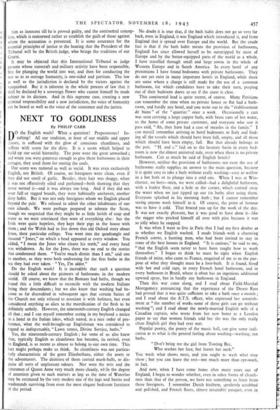NUREMBERG IS SUES
By NORMAN BENTWICH
THE Belsen trial is at last reaching its end, and justice will at last be done. The general verdict that is passed on its protracted hearing is. that, while it was an example of British administration of justice, conducted with dignity and with every regard for the accused, it involved an efflorescence of legal proce- dure. The twelve defending officers put all the forty-five accused persons into the box to tell a long story ; and people began to believe the wisecrack, that was passed around Luneburg in the first week of the trial, that they would save their clients from the gallows by boring them to death. It was another trouble that most of the accused were very small fry, wretched minions of the S.S.
What matters much more than the Belsen trial is the assize which was opened formally in Berlin some weeks ago, and is to be con- ducted in Nuremberg, before the International Military Tribunal. For here the accused are the authors, and not the depraved instru- ments, of a policy which flouted every international convention to which Germany herself was a party and every principle of humanity ; made war and terror the principal instruments of national policy, and openly proclaimed the mass-massacre of Jews, Russians and Poles as oneof the tasks of the Herrenvolk. What is in issue here is a new development of international criminal law and international criminal jurisdiction. It was in August last, after the end of the war, that the Big Four among the United Nations—omitting China —set up an international tribunal to try those Axis leaders "whose offence had no particular geographical location." They pres-ribed in a Charter its constitution, jurisdiction and functions. It is more strictly an inter-Allied military tribunal for the trial and punishment of the major criminals of the European Axis. It is composed of four members representing the Great Powers concerned in the European War, the U.K., U.S.A., U.S.S.R., and France. Each member has an alternate, and the presence of all four (or the alternate for any absent member), is necessary to constitute the quorum. At least three must vote for conviction. The British member and his alternate are distinguished judges of our High Court of Justice ; and the tribunal is military only in the sense that it is an instrument of the Military Control Commission.
The Charter, which established it, creates retrospectively the law it is to apply ; and thereby marks an innovation in the normal procedure of justice, modifying the general maxim: "no crime and no punishment without law." Just as in the Middle Ages, when the English Common Law was being moulded, the King's Chancel- lor issued a new writ when some new action was necessary, so today, when- the international law of war is being moulded, the nations must define fresh crimes and penalties in the cause of justice. While the major provisions of the law of nations in war are established, there were gaps and uncertainties about penalties, procedure and individual responsibility. The Charter fills in the gaps. Indi- vidnal responsibility is imputed where the group or organi- sation of which the accused was a member is adjudged to be a criminal organisation. The official position of the accused, or the plea that they were acting under orders, will not free them from responsibility ; though it may be considered in mitigation of punishment. Three classes of crimes come within the jurisdiction of the tribunal: (a) crimes against peace, which include planning, preparation and initiation of a war of aggression ; (b) war crimes, • which are violations of the laws and customs of war, and include deportations to slave labour of the civilian population, and the murder or ill-treatment of prisoners ; (c) crimes against humanity, i.e., murder, extermination, deportations and other inhumane acts com- mitted against any civilian population, or persecutions on political, racial or religious grounds. The clause is designed to comprise the barbarous massacres of Poles, Czechs and Jews, whether or not German subjects, and whether before or during the war. A new crime has been defined, genocide, which consists of the attempts to exterminate a people.
The indictment of the major war criminals, who are to be tried at the Grand Assize, was presented in their absence before. the Tribunal sitting in Berlin, by the leading counsel for the prosecution, and is a historic document. It has been compared with the Articles of Im- peachment, or the Acts of Attainder which once were presented at the bar of Parliament against fallen statesmen charged with high crimes and misdemeanours. Admittedly a political element is involved in the charges against the Nazi leaders, and the trials are not simply or purely a judicial process, but also an international Act of State. They 'are designed to demonstrate the application of the moral law to international relations. The first count in the indictment deals not with the specific acts which fall within the three categories, but with something more comprehensive: the formulation and execution by the defendants with other persons of a conspiracy to commit crimes against peace, war crimes, and crimes against humanity.
In accordance with the provisions of the Charter, the accused are individually responsible for their own acts, and for acts committed by any persons in the execution of the conspiracy. It is charged against them that they planned, prepared, initiated and waged wars of aggression, carried out ruthless wars against countries and popula- tions in violation of the rules and customs of war, and committed crimes against humanity within Germany and within occupied terri- tory. The programme and policy of the Nazi Party are exposed and scored in the indictment as the root of these crimes ; and the history of the party and the Nazi Government, from 1933 till the end of the war, is summarised in particulars of the crimes.
Another section of the indictment charges crimes against groups and organisations which were the directing bodies and the instruments of the Nazi regime. They include the Reich Cabinet, the Leadership Corps of the Nazi Party, the S.S. Force, the Secret State Police, commonly known as the Gestapo, the Storm Divisions, commonly known as the S.A., and finally the General Staff and High Command of the German Armed Forces. The charges are to be tried according to the fundamental principles of justice, if not according to the pro- cedure of English courts. Rules are laid down concerning the production of witnesses and of documents for the accused as well as the prosecution, and opportunity is given to the accused to name counsel for their defence.
A difference of opinion has been provoked about the defence. The Attorney-General, at the opening session when the indictment was presented, said that, while the accused could engage counsel to appear for them, he thought it doubtful whether English barristers should accept an invitation to plead for men charged with these crimes against the United Nations., The Bar Countil supported that warning notice ; but several leading barristers and others have expressed criticism of it as contrary to the tradition of the Bar, by which an advocate is free to appear before any Court for any person. It is suggested that the accused Nazis may be adequately defended by German lawyers, of whom one hundred are licensed to practise. But the German lawyers are all anti-Nazis ; a condition of their admission to practise. Legal issues of the greatest importance are involved in the trial, and it would seem desirable that they should be argued by qualified counsel without distinction of nationality. It may be that the restriction has been imposed because of the susceptibility for Russian feelings which have been troubled by the Belsen trial. Some compromise has had, indeed, to be made between the British con- ception of a criminal trial, which is tender to the accused and treat: him as innocent till he is proved guilty, and the continental concep- tion, which is concerned rather to establish the guilt of those against whom the accusation is presented. It is some assurance for the essential principles of justice at the hearing that the President of the Tribunal will be the British .judge, who brings the traditions of our Courts.
It may be objected that this International Tribunal to judge persons whose statecraft and military activity have been responsible, first for plunging the world into war, and then for conducting the war so as to outrage humanity, is one-sided and partisan. The law as well as the jurisdiction is declared by the victors against the vanquished. But it is inherent in the whole process of law that it shall be declared by a sovereign Power who cannot himself be made subject to its dictates. And in this supreme case, creating a new criminal responsibility and a new jurisdiction, the voice of humanity can be heard as well as the voice of the statesmen and the jurists.































 Previous page
Previous page